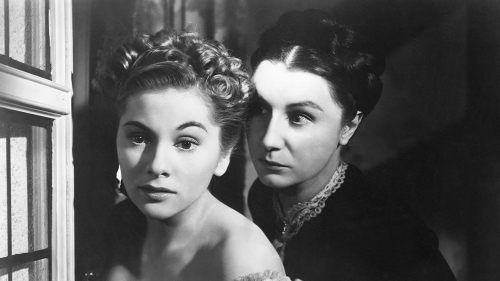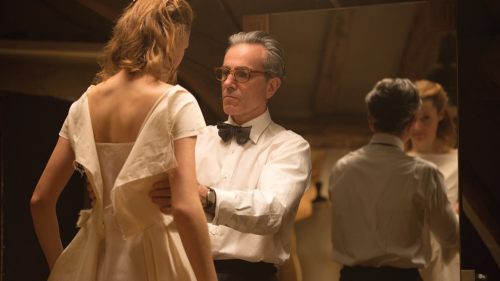Obviously We’re the Ladies: Daphne Du Maurier
When we think of the woman behind the master of suspense, Alfred Hitchcock, more often than not the first lady that comes to mind is Alma Reville. It’s an easy assumption, as the two were married from 1926 until Hitchcock’s death in 1980, and she also worked alongside Hitchcock for the first 2/3’s of his career, which began in the silent era and lasted until the 1970s. Alma was typically credited as script supervisor or co-screenwriter, but her contributions were far greater. For instance, if Alma hadn’t been working alongside Hitchcock during the production of Psycho, who knows if anyone would have caught Janet Leigh’s chest moving after she had been stabbed mercilessly in the shower. But besides Alma and her detailed eye that helped adapt so many of Hitchcock’s scripts, there’s yet another woman…
Well actually there are two other ladies, one being Joan Harrison who took over half of Alma’s duties after the birth of Patricia Hitchcock, but she’s not the one I’m referring to. No, the person I’m trying to get at is British author Daphne du Maurier, the mind behind three of Hitchcock’s biggest films: Jamaica Inn (1939), Rebecca (1940), and The Birds (1963).
Okay, so maybe two big films: Rebecca and The Birds. But Jamaica Inn was an essential film in some ways, if for no other reason than it being the last film Hitchcock made in the U.K. before his departure to Hollywood. It’s the one with Maureen O’Hara and Charles Laughton, the one that Daphne ended up hating, an opinion Hitchcock shared because Laughton rearranged the entire script so as to fit his star status, thus producing a movie that did not look at all like what the author or director had intended. Jamaica Inn caused Daphne to withhold Rebecca from studios out of fear that it would be obliterated on screen. Rebecca was, and still remains, her biggest and most popular novel. Per Margaret Forster’s biography of du Maurier:
But first [Daphne du Maurier] wanted to complete an adaptation of her own novel Rebecca for the stage…if the newly released film of Jamaica Inn was anything to go by, she would be wise to try to adapt her own work for any other medium. She was furious with the film. ‘Don’t go see it,’ she told [her editor], ‘it is a wretched affair.’
Hitchcock was given another opportunity though, with the help of David O. Selznick whose mission was to remain as faithful to the book as possible. Still, despite Selznick's effort to remain true to Daphne’s story, the Hays Code made it so the studio couldn’t work around Maxim de Winter getting off scot-free (spoiler alert) after murdering his wife. Maxim had to take some accountability, receive some sense of justice. And so the ending had to change. Even with the films minor alteration, Daphne insisted that it was one of her favorite adaptations.
But before we talk anymore about Rebecca, let’s reel it in a bit and start from the beginning. Born in London, England in 1907, Daphne du Maurier was one of many artists in her family: her parents, Gerald and Muriel were actors, her grandfather was a prominent author and cartoonist, her older sister was an author, and her younger sister was a painter. Daphne’s childhood differed from her sisters, partly because her father openly treated her like the son he never had and partly because she was just plain odd. Her observational tendencies, introversion, and confusion around her own sexuality separated her from the girls she attended boarding school with, the ones who linked arms as they walked to their next class. Though she labeled lesbians as boring early in life, refusing to categorize herself as one, her attraction to women remained with her until her death. See BBC’s 2007 film Daphne for a dramatic retelling.
Daphne developed an interest in writing early on, pondering plots and constructing narratives. Unfortunately, she hated actually sitting down and putting her words onto paper. But as the years went on she began taking action, starting with short stories and eventually shifting to biographies, novels, and plays. Despite her intellect, Daphne had to maintain her interest independently. Her parents, particularly Gerald, were supportive but agreed that college was not a woman’s place. How could she find a husband, push out babies, and pursue a career all at the same time? This isn’t to say that Daphne wasn’t interested in that part of life, she very much wanted to find a partner and ultimately have children, she just happened to also daydream about a more eccentric future. One where she could earn her own money and maintain an independent self.
When Daphne’s parents sought a vacation home that they could use for holidays, her vision became clearer. The small cottage named Ferryside that sat right on the River Fowey in south Cornwall was perfect for the writing life Daphne dreamt of: a quiet place for long walks, a house with windows looking out over the river, a structured environment, and more importantly, distance from her parents. At Gerald’s request, Daphne would have to prove her commitment to the craft, as well as cheer the fuck up during events and family engagements, before she could have the privilege of privacy.
And so Daphne did just that, writing an hour a day and plastering a smile on her face when family time came around. Little did her parents know, the short stories Daphne was writing centered on marriage and what a sham it was. Gerald was known for his adulterous behavior and Daphne was keenly aware of her mother’s intentional ignorance. She was able to publish one of these short stories in her grandfather’s paper. Between that and dropping her teen angst, Daphne was finally able to temporarily move to Ferryside to write her first book.
The book that came out of this inspiring freedom was The Loving Spirit, published in 1931. Hyped by the experience, Daphne immediately got to work on another book, and another, and another. Daphne managed to publish a book a year, all while meeting and marrying her husband Frederick Browning and pushing out three children. Although domesticity wasn’t exactly her strong suit, she really killed it in the writing department, and for that we thank her.
Relationships were the center of many of her short stories books, which is why some categorize her as a romantic novelist. But as her work progressed, eerie and ghostly undertones emerged and Daphne had no qualms about ending on a less than happy note. This may be the reason why Rebecca is one of her favorite adaptations. Hitchcock, in Francois Truffaut’s book Hitchcock/Truffaut, discusses his use of Mrs. Danvers, played by Judith Anderson. While he alters her character in a way that eliminates her background, which was a potential problem as Daphne was a real stickler for faithful adaptations, he balances this change by increasing her sense of ghostliness, stripping her of human qualities. Mrs. Danvers is seen as a shadow behind the second Mrs. de Winter, an outline in the doorway, an image floating towards Rebecca’s room where she is found folding the dead woman’s underwear…
Though Hitchcock had moved his way back into Daphne’s good graces with his adaption, he was eventually shoved out again after The Birds was released in 1963. What she witnessed on screen was monumentally different than the short story her editor labeled a masterpiece. To be fair to Hitchcock, the credits clearly read “Inspired by” not “Based on.” The original story, which is far more disturbing than the film, was published as part of a collection titled The Apple Tree. It tells the story of a farmhand and his family who are attacked by a flock of birds. Like the film, the attacks are everywhere, and soon the BBC is calling the event a national emergency. There’s audible plane crashes all around the family, eventually the radio goes silent, and, well, I shouldn’t give too many spoilers away. But I will say that while Hitchcock’s film ends on a note of what appears to be hope; Daphne’s story does not.
The woman’s brilliant. Her outward commentary on lesbians is a bit uncomfortable, especially given the fact that she often wrote about her female infatuations, but I’m going to go ahead and assume that her attitude has more to do with the confinements of the early 20th century. Hitchcock wasn’t the only person lucky enough to adapt Daphne’s work. We’ve got The Scapegoat (1959) directed by Robert Hammer, My Cousin Rachel (1952) starring one of the babeliest babes of all time, Olivia de Havilliand, Don’t Look Now (1973) directed by Nicolas Roeg, Frenchman’s Creek (1944) starring yet another total babe, Joan Fontaine (de Havilland’s rival and sister), etc. etc. You get my point. Rebecca, since its release in 1938, has never gone out of print, and Daphne’s work continues to inspire today. Come summer 2017, we’ll be seeing a remake of My Cousin Rachel starring Rachel Weisz and Sam Claflin. I recommend seeing Daphne (2007) before buying your ticket.



